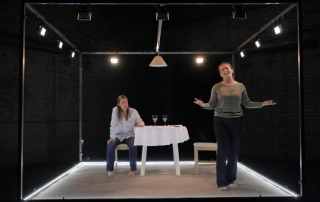NU Women’s latest session was on ovarian cancer awareness, delivered in conjunction with Ruth Grigg from the charity Ovacome, Hillary an ovarian cancer survivor, and Dr Yvette Drew from Newcastle University’s Centre for Cancer.
Ruth is part of the Ovacome charity who supply emotional support and information to anyone who’s been affected by ovarian cancer and opened the session. As the charity has been run since 1996, Ovacome has spoken to a lot of women and have gained progress in promoting women’s knowledge of ovarian cancer.
Ruth shared this knowledge with attendees of the NU Women lecture stating that typically there is little known or understood about ovarian cancer. As ovarian cancer is uncommon, with 7,000 diagnoses each year (in the U.K. the chances are 1:52 ), it is not represented as loudly in the cancer community because the chances of other cancers such breast are much higher (1:7 in the U.K). Moreover, ovarian cancer usually presents late as a Stage 3 CD (there are 4 stages), so by this time the cancer has spread to the abdomen and other organs before a GP or any other services become involved.
The delay of spotting the cancer is due to vague signs and symptoms which don’t seem significant in the context of day to day life. Ovarian cancer is most common in people who are postmenopausal which means 83% of cases are diagnosed in those aged 50+. Regardless, the cancer can present in younger people too which is why it was so important for Ruth to go through the BEAT campaign, outlining the specific symptoms:
B is for BLOATING (this is new for you and is persistent)
E is for EATING DIFFICULTIES (you are eating less and experiencing reflux)
A is for ABDOMINAL PAIN (this is new for you and is getting worse over time)
T is for TOILET HABITS (unusual urinary or bowel movements)
Treatment for ovarian cancer requires a major hysterectomy surgery, followed by chemotherapy.
A survivor of ovarian cancer, Hilary followed on from Ruth and gave a personal account of her journey from being diagnosed in April 2006 at the age of 48. Being a Chemist, with a long experience the pharmaceutical industry, BP and civil service, Hilary explained she was very used to being tired and stressed, especially when she switched between two jobs around 2006.
Notably, she remembers getting a smear test but the nurse couldn’t get a good enough sample as the process was too painful, she was told she would be contacted by the GP and thought nothing more. As life went on Hilary started developing bladder urgency but put this down to menopause. The turning point was when Hilary experienced persistent abdomen pain so severe she physically had to pull off the motorway as the pain was unbearable.
After going to hospital, the CT scans showed a 15cm cancerous cyst which grew to 17cm two weeks after. Hilary explained how her fallopian tubes, uterus and omentum were removed, which was followed by chemotherapy at the end of June. Between starting her chemotherapy in June and her treatment finishing in November 2006, Hilary worked part time with a supportive employer which helped her greatly- emotionally and mentally.
Hillary has now been discharged from her GP, reaching her 5 year remission mark and says that she is in good health but has experienced the side effects of surgical menopause such as brutal hot flushes, memory loss and depression. After 6 months Hilary began HRT and felt much better and is still on a low dose patch for the rest of her life.
After Hilary’s moving account, reminding us that sometimes the session moved from the personal to the scientific. Dr Yvette Drew gave us a flavour of what the gynecology team are exploring – such as the challenge of developmental therapeutics in ovarian cancer, as well as the lack of effective screening. Dr Drew explained that there has been significant barriers to progress in developing new treatments, shockingly stating that there has been no new treatments approved between 2006-2013 despite other cancers seeing developments.
However, we learned that this was due to the difficulty finding where the cancer originates. There is a common misconception that the cancer begins in the ovaries but in fact ovarian cancer starts in the fallopian tubes. Sadly, scans fail to show this. Nevertheless the management of ovarian cancer lies with the revolution of PARP inhibitors moving forward to PARPi combinations including immune checkpoint inhibitors.
Dr Drew stressed the importance of needing to recognise that epithelial ovarian cancer is many diseases in cancer drug development (High-grade serous, clear cell, low-grade serous, endometrioid, mucinous) and that programmes for drug development, design of clinical trials, and approaches to systemic treatment need to reflect this knowledge and focus on targeting the sub types of EOC.
With additional thanks to the chair, Nicola Curtin, Professor of Experimental Therapeutics at Newcastle University , this session addressed this challenging topic in an approachable way. Identifying the signs and symptoms of ovarian cancer as well as discussing recent developments at Newcastle and beyond, hoping to reach as many women as possible.
For further information about Ovacome and the BEAT campaign please visit the following:
- Ovacome website : www.ovacome.org.uk
- Link to the BEAT campaign on signs and symptoms https://www.ovacome.org.uk/Pages/Category/symptoms
- Ovacome’s support service can be accessed by phone on 0800 008 7054 and via their website
You can watch the recording of the full event below:





